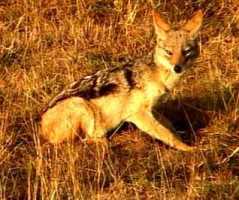 |
 |
|
Scientific Name: Canis mesomelas
Common Name: Black-backed Jackal, Schabrackenschakal,
Rooijakkals, Ombadje, Usibwe, /Gireb. Le Chacal a chabraque, Chacal con lomo
negro., Sciacallo
Distribution: South Africa, Namibia, Botswana, and
Zimbabwe and in the region of the along the eastern coastline, including Kenya,
Somalia, and Ethiopia
Description: The main characteristic of the
black-backed jackal, which gives it its name, is the black hair running from the
back of the neck to the tail . The chest is white, and the under parts are white
to rusty white, whereas the rest of the body ranges from reddish brown to ginger
in appearance. The head is dog like, with a pointed muzzle and high pointed
ears. The winter coat of male adults develops a reddish to an almost deep russet
red colour. Females tend to be less richly colours.
Difference in Sex: Very little, female a little bit
smaller.
Average Weight of Adult male: about 8 kg
Habitat: A wide range of habitats, particularly drier
areas and open terrain, but can also be found at the Atlantic coast. They have a
wide habitat tolerance, and are independent of water, which may only be
available seasonally, but they will drink when water is available.
Habits: Black-backed jackals are like other small
wolves and foxes in their foraging. They are social animals and often run in
packs when hunting. Working together as a team eases the difficulty of bringing
down a large prey. However, the black-backed jackal has also been found to hunt
alone or with its mate.
Main feeding time: Day and night
Size: Shoulder height 38 cm, mass (m) 8 kg, (f) 7 kg.
Gestation: 2 months
Number of young at birth: 3 to 8 pups
Communication: A very distinct "nyah-yah-yah" growls
and yelps.
Age: 10 to 14 years
Diet: mainly feed on insects and smaller mammals such
as rodents, hares, and small antelopes but may eat also quantities of plant
material. Many jackals have been observed scavenging the remains of a feline
kill such as that of a lion, leopard, or hyena before vultures pick everything
clean.
Enemies: Lions, Leopard and Hyena
Interesting facts: Run up to 55 km/ h
Here is a
Bushmen / San fable on how the Black-back Jackal got its black back. |